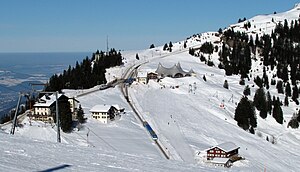Vitznau-Rigi-Bahn
| Rigi Railways | |
|---|---|

The junction at Rigi Staffel in the snow (February 2009) as viewed from Rotstock. The VRB descends to the left, the ARB to the right, with both lines continuing together to the summit, upper right. An ARB train is in the passing loop, whilst another descends to Arth. A third train is stabled on the connecting track between ARB and VRB.
|
|
| Overview | |
| Native name | Rigi Bahnen |
| Type | VRB, ARB: rack railway LWRK, LKR, LORB, LKüS, LVH, LVW, LBU: cable car |
| System | Rigi Bahnen |
| Status | operational |
| Locale | Lucerne/Schwyz, Switzerland |
| Termini | VRB: Vitznau ARB: Arth-Goldau LWRK: Weggis (Luftseilbahn) LKR: Kräbel LKR LORB: Gersau Gschwend LKüS: Küssnacht am Rigi LKüS LVH: Buholz Vitznau LVH LVW: Buholz Vitznau LVW LBU: Brunnen, Seilbahn Urmiberg VRB, ARB: Rigi Kulm LWRK: Rigi Kaltbad LKR: Rigi Scheidegg LORB: Burggeist (Rigi Scheidegg) LKüS: Seebodenalp LVH: Hiterbergen LVW: Wissifluh LBU: Timpelweid |
| Stations | 27 |
| Services | 9 |
| Daily ridership | 4300 (2015) |
| Operation | |
| Opened | 1873 |
| Owner | VRB, ARB, LWRK: Rigi Bahnen AG LKR: Luftseilbahn Kräbel-Rigi Scheidegg AG LORB: Rigi-Scheidegg AG LKüS: Luftseilbahn Seebodenalp AG LVH: Seilbahngenossenschaft Hinterbergen LVW: LBU: Luftseilbahn Urmiberg AG |
| Operator(s) | VRB, ARB, LWRK: Rigi Bahnen AG |
| Character | Mountainous |
| Technical | |
| Line length | VRB: 5 km (3.1 mi) ARB: 6.8 km (4.2 mi) |
| Number of tracks | single with passing loops |
| Track gauge | 1,435 mm (4 ft 8 1⁄2 in) standard gauge |
| Electrification | 1500 V, DC, overhead wire |
| Highest elevation | VRB, ARB: 1,748 m (5,735 ft) LWRK: 1,424 m (4,672 ft) |
| Maximum incline | VRB: 25 % ARB: 20 % |
| Rack system | Riggenbach |
Rigi Railways (German: Rigi Bahnen) is a group of railways on the mountain Rigi, located between two of the arms of Lake Lucerne, in Switzerland. They include two standard gauge rack railways, the Vitznau–Rigi Bahn (VRB) and the Arth–Rigi Bahn (ARB), along with the Luftseilbahn Weggis–Rigi Kaltbad (LWRK) cable car and six smaller cable cars: Luftseilbahn Kräbel–Rigi Scheidegg (LKR), Luftseilbahn Obergschwend–Rigi Burggeist (LORB), Luftseilbahn Küssnacht–Seebodenalp (LKüS), Luftseilbahn Vitznau–Hinterbergen (LVH), Luftseilbahn Vitznau–Wissifluh (LVW), and Luftseilbahn Brunnen–Urmiberg (LBU).
Reaching a height of 1,752 metres (5,748 ft) above sea level, the Rigi Railways are the highest standard gauge railway in Europe. They are also the highest railway in both cantons of Lucerne and Schwyz. The Vitznau–Rigi Bahn is also notable as the first mountain rack railway in Europe, and only the second in the world, after the Mount Washington Cog Railway in the United States.
Aware of the scenic location of Mount Rigi, Swiss engineer Niklaus Riggenbach masterminded the construction of a railway from Vitznau, on the shores of Lake Lucerne and the southern flank of Mount Rigi, to a point close to its summit. He already had the technology as he had patented, in France in 1863, a system of toothed racks set between the railway tracks interlocking with cogwheels fitted under the locomotives.
Jointly, with fellow engineers Olivier Zschokke and Adolf Naef, he submitted an application to the canton of Lucerne for permission to build a line from Vitznau to Rigi Staffelhöhe, a point somewhat below the summit of Rigi, but the nearest point to the summit within that canton. The cantonal administration already knew of the success of the Mount Washington Railway and saw the advantages in this construction, granting permission on 9 June 1869.
...
Wikipedia
